The Igbo Traditional Male Attire: Exploring the Exquisite Fabrics
Igbo traditional male attire is revered for its deep cultural significance and widespread appreciation within both Igbo culture and Nigeria as a whole. The captivating fabrics, intricate weavings, and unique styles make these attires impossible to overlook. With a rich historical background, it is no wonder that they continue to hold great importance in present times.
In ala Ị̀gbò (Igboland), Nigeria, traditional attire goes beyond mere clothing; it tells a story about the wearer. By observing an individual’s attire, one can easily discern their status, whether as a chief, groom, or even a king. These garments not only convey masculinity but also captivate the attention of onlookers. They embody cultural vibrancy and ancestral pride.
Each thread of fabric carries a captivating tradition, representing the deep-rooted heritage, symbolism, and identity of the Igbo people. In earlier times, both men and women in Igbo society wore wrappers. This wrapper, combined with a top like isiagu, formed a significant part of their attire. Although trousers have become more prevalent due to cultural exploration, the wrapper culture still maintains its relevance.
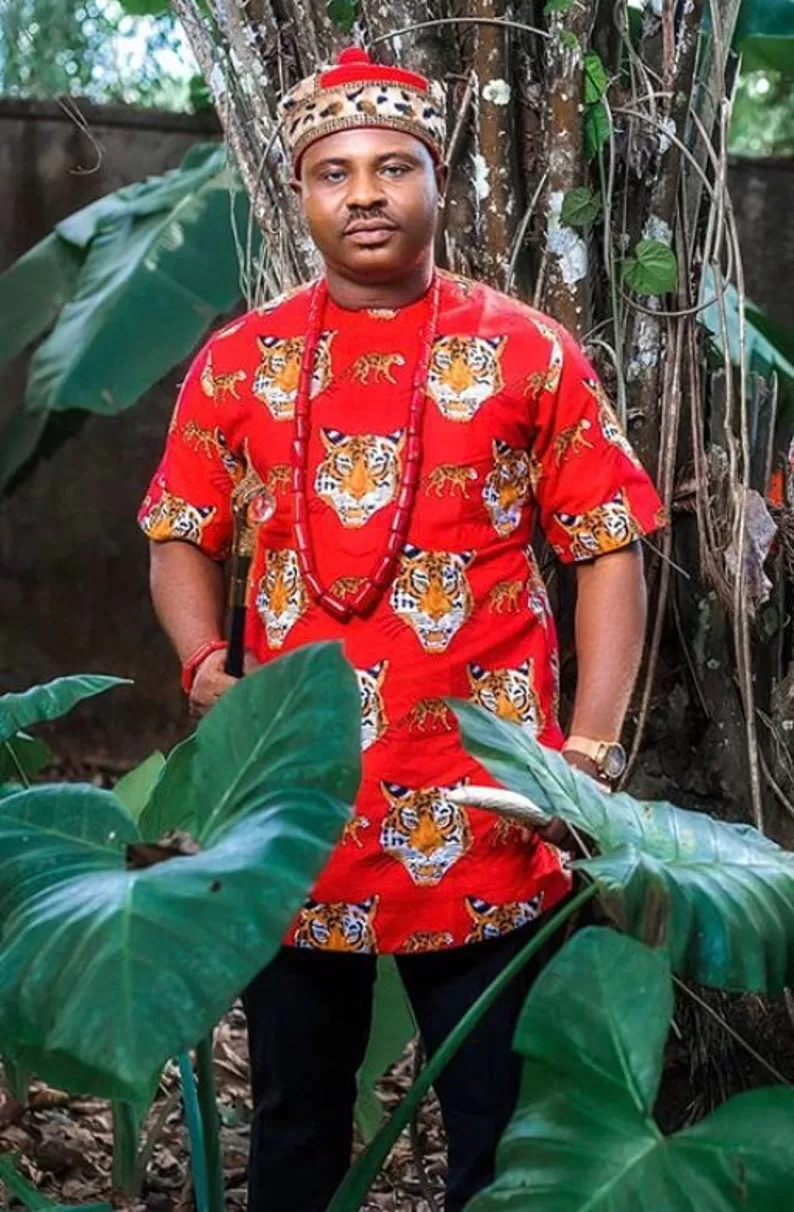
However, traditional Igbo attire is incomplete without the okpu (cap) and the mkpo (walking stick). These accessories are essential components that contribute to the overall aesthetic appeal and cultural significance of the attire.
Embarking on a journey through Igbo traditional male attire means exploring the exquisite fabrics that adorn Igbo men. Each piece is not just a mode of dress; it carries the weight of centuries-old tradition and untold stories. It is a testament to the essence of identity and community.
From the majestic hills of Enugu to the bustling streets of Onitsha, the Igbo people communicate their heritage through clothing that transcends time. The significance of these garments stretches far beyond fashion, encompassing spirituality, social ceremonies, and the preservation of a rich cultural legacy.
History Of Igbo Traditional Male Attires
The Igbo traditional male attire holds a significant place in Igbo culture, serving as a reflection of identity and social standing. Throughout history, the traditional Igbo male fabric has undergone slight changes in color, form, and material, but its essence remains rooted in the past.
Originally, traditional Igbo fabric was conserved, with the primary purpose being to conceal private parts. Elders were fully clothed, while children remained naked until adolescence.
One interesting and unique aspect of Igbo men’s traditional attire is the distinction between royal households, titled holders, chiefs, and untitled men. Each group has its distinct clothing style, signifying their social status and position within the community.
However, traditional Igbo attire is incomplete without the okpu (cap) and The walking stick (mkpo). They are an integral part of Igbo men’s attire, symbolizing authority, wisdom, and masculinity. No traditional Igbo outfit is considered complete without these essential accessories, which serve as a functional tool and a fashion statement.
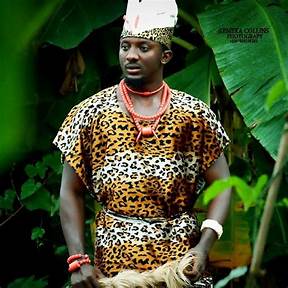
In earlier times, both men and women in Igbo society wore wrappers as a fundamental component of their attire. Men would typically wear loin cloths that enclosed their waist and were fastened at the back. This type of clothing was suitable for the intense heat and physically demanding tasks such as farming. Men also had the option to tie a wrapper over their loin cloth for added modesty and versatility.
For special occasions like traditional weddings, men adorned themselves with materials like gorge, which was expensive and signified wealth and prestige. Pairing the gorge with the Isiagu, a fabric popular among wealthy individuals and traditional title holders, created a regal and distinguished look.
Exploring the origins of Igbo traditional male attire allows us to delve deeper into the historical roots of this vibrant cultural expression. Over time, traditional attire has evolved alongside societal changes, reflecting shifting fashion trends and influences from neighboring cultures. However, its core purpose of preserving identity, heritage, and community remains steadfast, making it an integral part of the Igbo culture.
Exploring the Finest Fabrics in Igbo Traditional Male Attire: Top 5 Selections
-
Isi-Agu
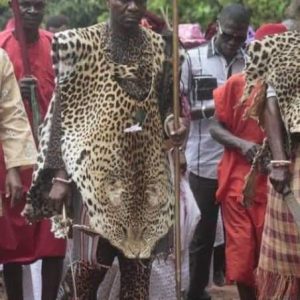
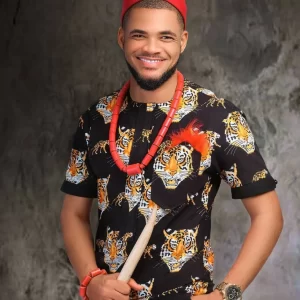
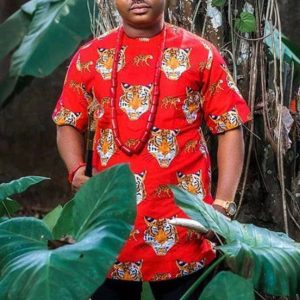
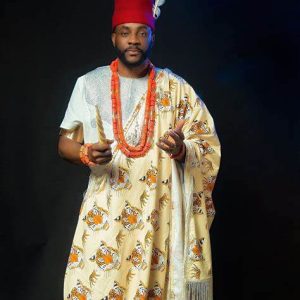
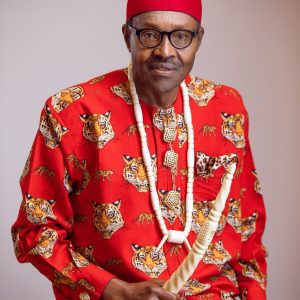
Features:
- Color: Black, white and red
- Fabric: Suede, Silk
- Occasion: Coronation, Traditional ceremonies
- Style: According to preference
2. The Isi-Odum (Lion Head)
The Isi-Odum fabric draws inspiration from the isiagu, featuring a scattered lion’s head print on the fabric. Initially, both the isiagu and isiodum were referred to as isiagu, causing some controversy about isiagu. The mistake arose from the fact that lions were not traditionally found in the Igbo region, as they primarily inhabited the savannah. However, this misconception was embraced due to the recognition of the lion as a powerful force in the jungle. Thus, the animal totem of the lion was incorporated, resulting in the creation of isiodum.
Similar to isiagu, isiodum fabric is crafted from suede or silk and can be woven according to individual preferences. Nowadays, it is also worn by many other tribes who incorporate it into their traditional styles. While isiodum signifies prestige, it does not hold the same traditional significance as isiagu, which remains the embodiment of Igbo traditional attire.
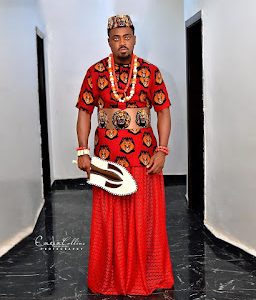
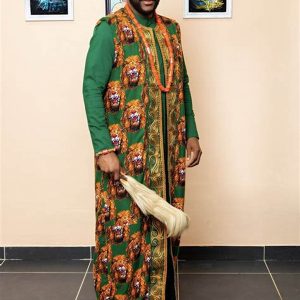
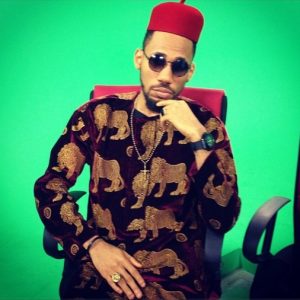
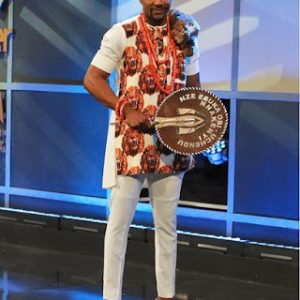
Features:
- Color: Black, white, green and red
- Fabric: Suede, Silk, velvet
- Occasion: Coronation, Traditional ceremonies
- Style: According to preference
3. The Senator:
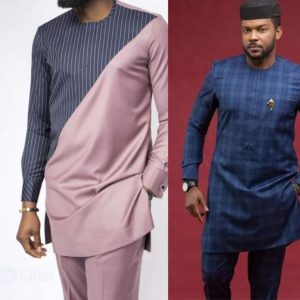
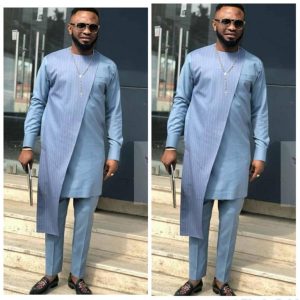
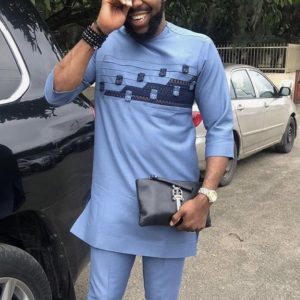
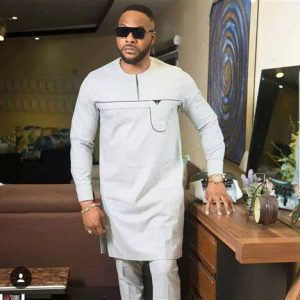
Features:
- Color: assorted
- Fabric: Cashmere
- Occasion: Wedding, Work, Church e.t.c
- Style: According to preference
4. The Akwete:
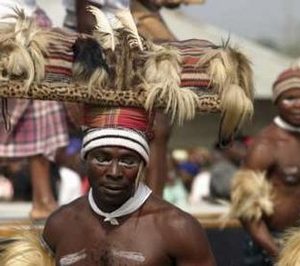
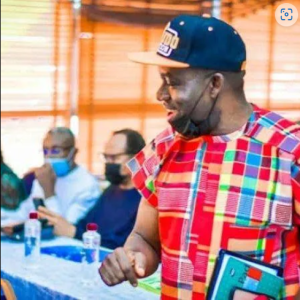
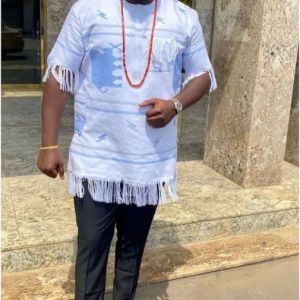
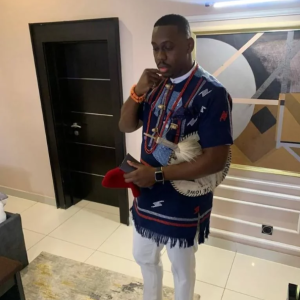
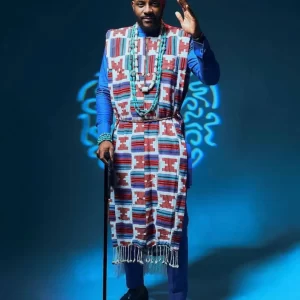
Features:
- Color: Complex weave designs and geometric patterns, with many vibrant colors
- Fabric: Cashmere
- Occasion: Traditional, Coronation, Wedding, Work, Church e.t.c
- Style: According to preference
Isiagu Controversy: The Story Behind The Igbo Attire
Nigerian Couple Goes Cultural In Isiagu Suit And Wedding Gown (Photos)
5. The Ankara:
Ankara fabric has gained popularity among the Igbo people as a favored choice for traditional male attire. Although not of local origin, Ankara was initially created and developed by the Dutch but later became widely embraced in Africa. The Igbo community finds expression for their traditional attire desires through the vibrant prints of Ankara.
This fabric is categorized as African wax print fabric and is distinguished by its striking colors and intricate designs. Known by various names such as African prints, wax prints, Dutch wax, Kitenge, Shweshwe, Hollandis, and more, Ankara fabrics are meticulously printed on 100% cotton and boast a diverse range of captivating colors and patterns.
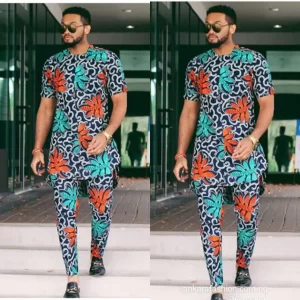
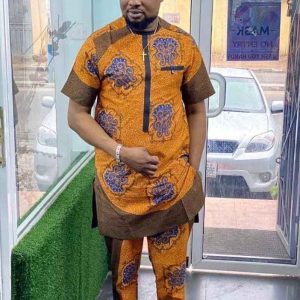
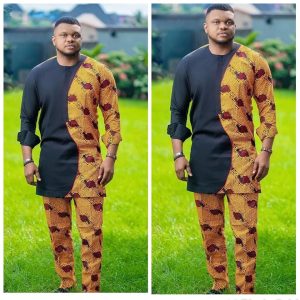
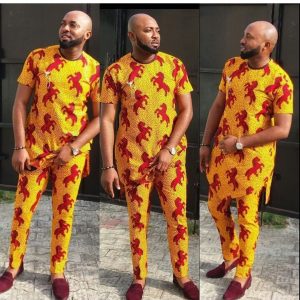
Features:
- Colors: African wax fabric, Bold and bright colors with intricate designs
- Fabric: 100% cotton
- Occasion: Traditional, Weddings, Festivals, Work, Church, Casual, Formal, etc.
- Styles: Available in a variety of styles
In conclusion, the Igbo traditional male attire is not only a manifestation of cultural heritage, but also a testament to the intricate craftsmanship and artistic expression that goes into creating these exquisite pieces. From the selection of vibrant fabrics to the careful attention to detail in the embroidery and embellishments, every element tells a story and preserves the essence of Igbo traditions. As we continue to appreciate and celebrate diversity in our increasingly globalized world, let us remember to honor and embrace the richness of cultures like the Igbo, for it is through this mutual appreciation that we can truly foster understanding and unity. So, next time you see an Igbo man adorned in his traditional attire, take a moment to admire the beauty and significance it holds, a true reflection of the people and history it represents.
Post Disclaimer
The opinions, beliefs and viewpoints expressed by the author and forum participants on this website do not necessarily reflect the opinions, beliefs and viewpoints of Anaedo Online or official policies of the Anaedo Online.




